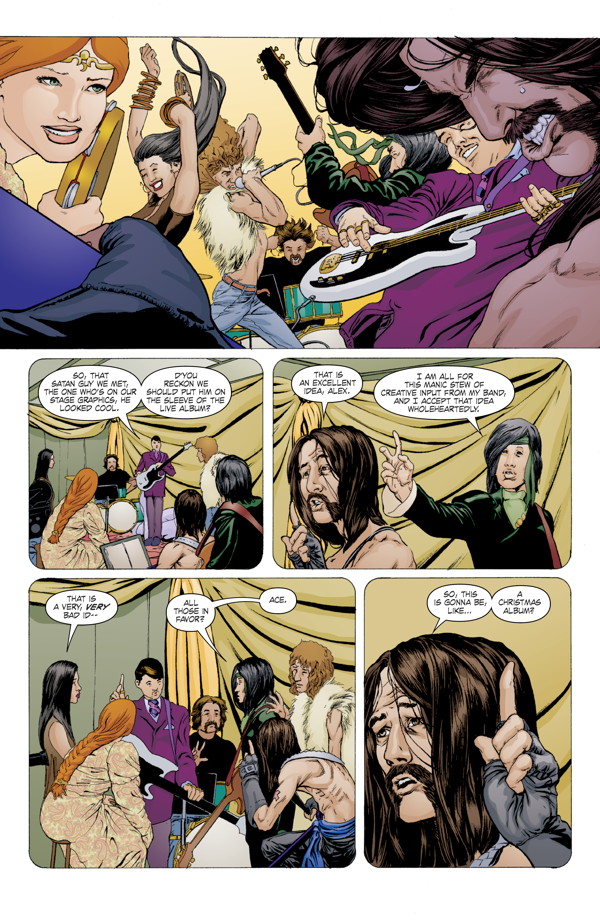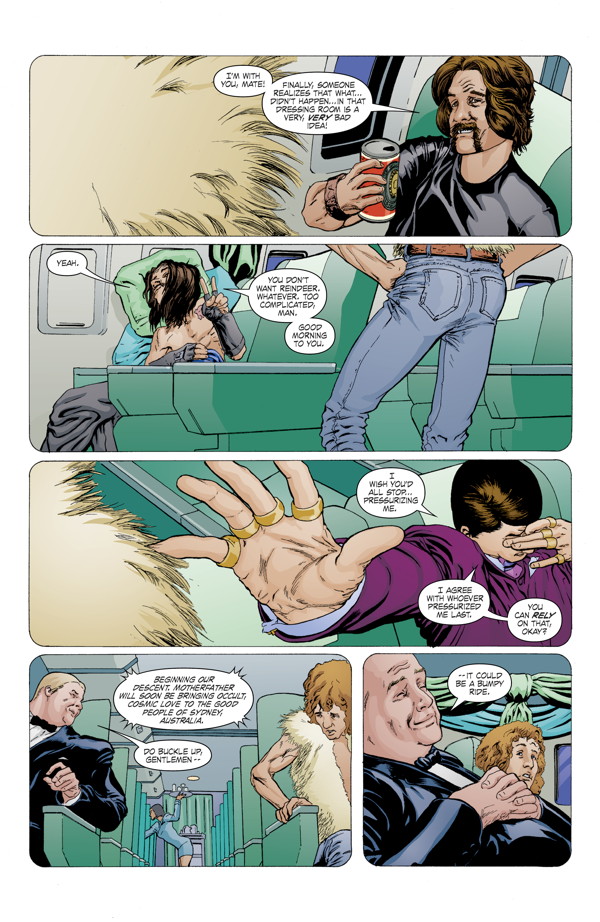For anyone reading the six-issue miniseries, “This Damned Band,” it should be pretty clear that Paul Cornell is playing a longer game here. So, while the second issue seems to lose the momentum the series gained in the final pages of its debut, rest assured that he’s laying the groundwork to tell the story he wants to tell. And it is a story worth investing in.
I have to hand it to Cornell’s script work. After the band’s climactic, drug-fueled satanic vision from the first issue, it would have been very easy to drive the plot forward with more shocking revelations about the trouble the members of Motherfather have found themselves in. In fact, that’s what I expected to happen. But, much to my surprise—and pleasure—that’s not the direction he took.

Cornell keeps the story grounded, playing it cool and favoring nuance to story-driven plot elements. He immediately addresses the band’s shared hallucination—or vision—with individual interviews, sticking with the documentary style that was used in the debut. Rather than jump into the mythology, he lets the band and the audience linger on doubts of whether or not what these drug-addled rock stars actually saw what we were shown (all of them except for Kev, of course, whose dyslexia-induced vision made me laugh out loud).
So far, the documentary approach has worked. Playing off of seminal works like “Gimme Shelter” or their parodies like “Spinal Tap,” the style has driven a lot of the choices in the story. It works not only to build interest, but also to provide a narrative that feels authentic despite its supernatural tendencies.
These characters feel genuine. They’re believable and relatable, even with their excessive rock star lifestyles. Their denial makes sense. They’re about sex, drugs, and rock and roll—that’s pretty much it. Their professed worship of the dark lord is all an act, so they wouldn’t jump in line and believe they had a vision. They’ve probably had a lot of visions considering the amount of drugs they experiment with, but none of those ever altered their world very much.
While there was no major reveal like in the first issue, this one does leave us with a cliffhanger, which again just goes to show that Cornell has plans for this series. The nuance will only go so far, but it does pay out dividends for the attentive readers. It might be possible to start piecing some of the things we’ve been privy to and trying to figure out the mythology of the series.
Even after subsequent readings of the second issue, the bigger picture starts to appear. The clues are subtle and return to some elements that were introduced in the first issue. It’s proof of how important it is to try and pick up the things that seem out of place and even prompted me to revisit some of the bonus material provided at the back of both issues to try and decipher any relevant clues. If anything, that’s a compliment to Cornell’s scripting. I’m certain that when the series wraps and readers go back to look over these early issues, they’ll see the groundwork that was laid very early on.
When the series wraps and readers go back to look over these early issues, they’ll see the groundwork that was laid very early on.
I appreciate the ambiguity. What was an outright visitation in the first issue is now not so certain. In turn, that’s just made me more curious about what’s going to happen to Motherfather. And it’s made me all the more paranoid. I’m more attentive than ever to the tiny clues that Cornell leaves peppered throughout the issue, trying to see if I can make any sort of sense from the plot threads he’s started to lay down.
Despite the cliffhanger, the stakes do remain decidedly low because of the slower pace. While I understand what he’s working for, it is a criticism that needs to be mentioned. This issue seems like more of a stepping-stone or an epilogue to the first rather than a stand-alone entry in the mega-group’s saga. Because of the low stakes, sometimes the humor—which worked so well in the first issue—falls flat. It needed more energy and conflict to really make it work and while there were plenty of moments to still crack up at, Cornell is going to need to pick up the pace if he wants the humor to stick its landing.

Tony Parker’s art still succeeds, capturing the feel of an early-70’s rock mega-group. The characters look as if they were each plucked form that era, but avoid dipping into parody or caricature. Lovern Kindzierski’s colors only add to the feel of that bygone era. Together, they’ve created a feasible, living alternate history. It’s hard not to compare it to the fictitious Stillwater in Cameron Crowe’s “Almost Famous,” because both Motherfather and Stillwater feel like they should have existed.
The second issue of “This Damned Band” remains fun while it explores its intriguing premise. It’s taking a real look at the demi-god status that rock stars from the early 70’s experienced and poking holes in the culture that surrounded it. Cornell is going to have to give readers a little more, though, reaching the mid-way point for the series in the next issue. In the meantime, it’s series that demands attention—especially to the tiny details and hints it drops along the way.
7.5/10